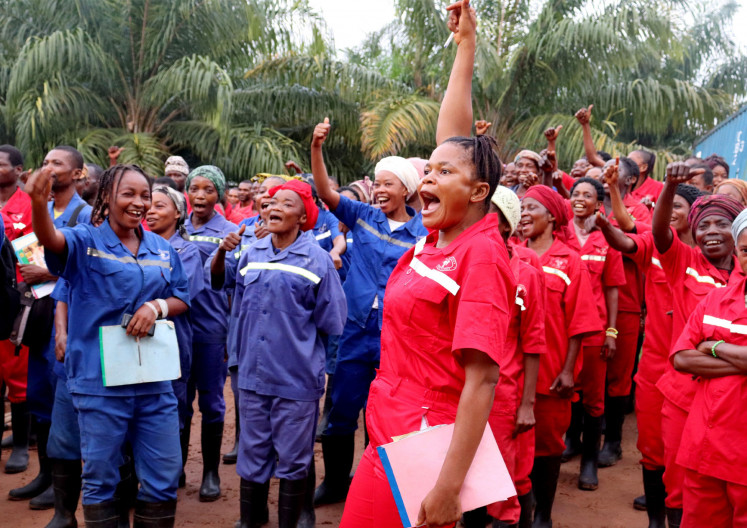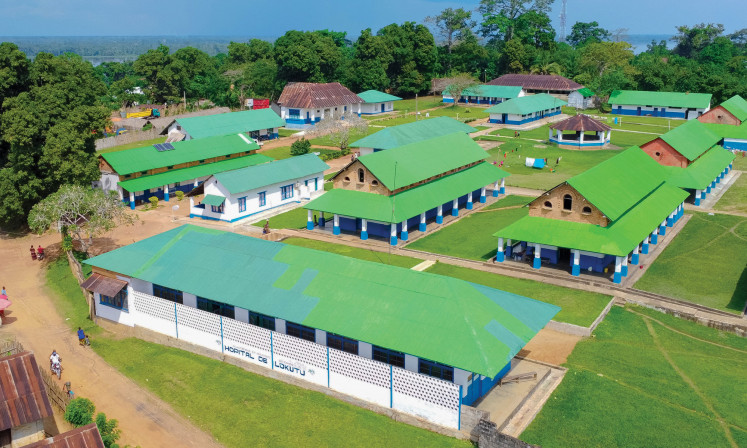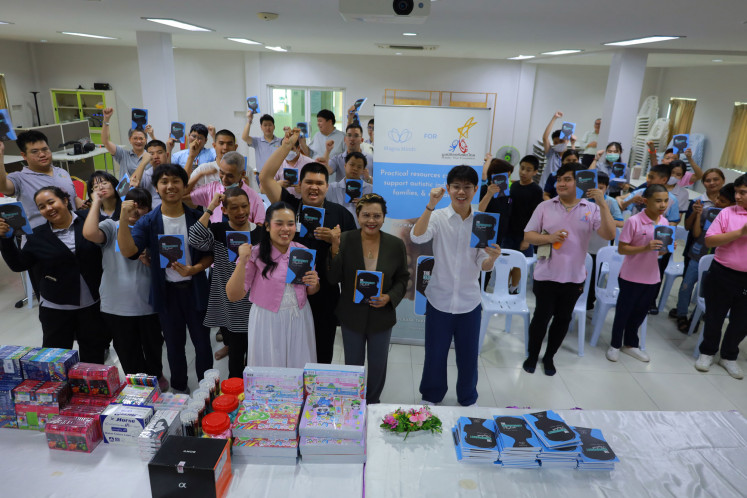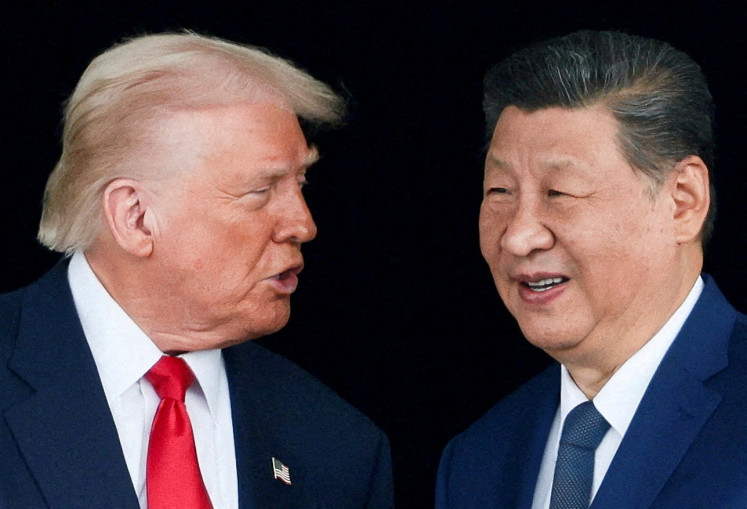Popular Reads
Top Results
Can't find what you're looking for?
View all search resultsPopular Reads
Top Results
Can't find what you're looking for?
View all search resultsIPOC 2024: PHC Positions DRC as The Next Frontier for Sustainable Palm Oil Industry
Change text size
Gift Premium Articles
to Anyone
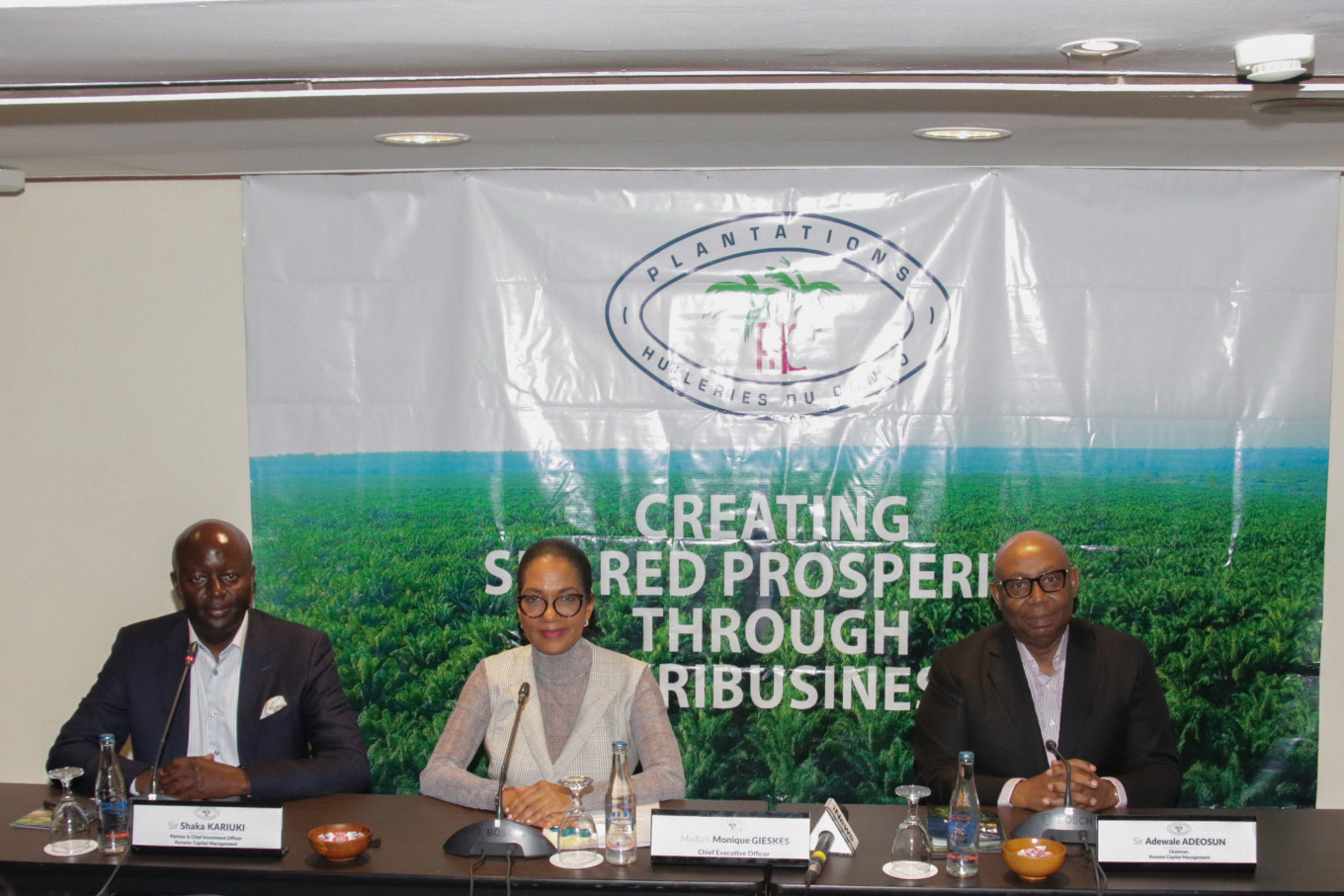 Ms. Monique Gieskes, CEO of Plantations et Huileries du Congo, PHC (middle) is joined by PHC shareholders, Chairman Adewale Adeosun and Board Director, Shaka Kariuki of Kuramo Capital Management during a press conference on the sidelines of the International Palm Oil Conference in Bali Indonesia. PHC aims to position DRC as the next frontier for sustainable growth of the palm oil industry.
Ms. Monique Gieskes, CEO of Plantations et Huileries du Congo, PHC (middle) is joined by PHC shareholders, Chairman Adewale Adeosun and Board Director, Shaka Kariuki of Kuramo Capital Management during a press conference on the sidelines of the International Palm Oil Conference in Bali Indonesia. PHC aims to position DRC as the next frontier for sustainable growth of the palm oil industry.
T
he Democratic Republic of Congo (DRC) has been participated in the 20th Indonesian Palm Oil Conference (IPOC 2024) in Bali on Friday. Monique Gieskes, CEO of Plantations et Huileries du Congo (PHC), the country's leading palm oil company, invited participants to consider the DRC as a land of exceptional opportunity for the palm oil industry and as an investment destination of choice.
"We at PHC stand ready to work with you to make these opportunities a reality," Gieskes said.
During the IPOC 2024, Gieskes has presented PHC's vision and commitments for the sustainable development of the palm oil industry in the DRC. As the country's leading palm oil company, PHC aims to position the DRC as a new frontier for environmentally friendly palm oil based on sustainable and responsible practices.
The event was also attended by Adewale Adeosun, Chairman of Kuramo Capital Management, PHC's major shareholder, and his partner and Member of PHC's Board of Directors Shaka Kariuki.
Gieskes recalled that the the palm oil industry in Congo began with PHC over 100 years ago, when William Lever of the Lever Brothers Company came to the then Belgian Congo to produce palm oil to supply his soap factory in England. He went on to create the Unilever corporation in 1929 by merging the Lever Brothers Company with the Margarine Unie of the Netherlands.
Gieskes also spoke of the DRC's contributions to the industry's technical and scientific advances, notably with the creation of the Tenera variety and the Mongana Report, which remains a world reference in palm oil engineering.
“We believe that the DRC is the next frontier for the expansion of palm oil production,” she emphasized.
Gieskes explained that DRC have abundant suitable land that could be used for palm oil. The Center for International Forestry Research (CIFOR) has estimated that DRC has at least, 167 million hectares of land suitable for palm oil cultivation, of which, 145 million hectares (or 87%) are found in areas that are compatible with current environmental standards such as the Roundtable on Sustainable Palm Oil (RSPO).
Another reason is because of availability of exceptional genetic materials. “The well-known Yangambi variety came from the Congo. The oil palm grows in a diversity of microclimates in DRC, and other exceptional genotypes could be found there, including genotypes devoid of carotenoid pigmentation but rich in vitamin E,” she added.
The DRC is home to over 100 million people. The unemployment rate is high especially in the rural areas where 54% of the population live and incomes are among the lowest in the world.
“Oil palm plantations are therefore welcomed employment opportunities,” Gieskes said.
Women employees at PHC. Women employees in Lokutu plantation during the morning call. Over the last 3 years, Plantations et Huileries du Congo (PHC) has tripled its number of women employees from 4% to 15%. PHC offers direct employment to over 10,000 individuals in the DR CongoPHC has also launched a small grower scheme that we call “Partner plantations” whereby villagers, around PHC concession, are encouraged to develop their own oil palm garden and supply fresh fruit bunches to PHC palm oil mills. They receive planting materials and technical support from the company.
Access to a large palm oil consumer base Palm oil has also been a major part of the diet of Africans for thousands of years. It also has cosmetic and medicinal applications.
“Located in the center of Africa and sharing its borders with nine other countries, the DRC is uniquely positioned to access a market of close to a billion people,” CEO said.
The DRC has also shown strong commitment to a sustainable palm oil sector During COP-22 in 2016 in Marrakech. The DRC and other African countries committed themselves to the sustainable development of the palm oil value chain in what is known as the African Palm Oil Initiative.
“PHC is in support of this commitment and has chosen to follow a green growth strategy based on yield intensification, best production practices rooted in precision agriculture, reduced reliance on the use of fossil fuels, zero deforestation, biodiversity conservation, and investment in social and economic development of communities located around our operational sites,” She added.
PHC’s Lokutu Hospital. Plantations et Huileries du Congo (PHC) has built 4 hospitals in their areas of operation, with a total bed capacity of 460 beds, in Lokutu, Yaligimba and Boteka. PHC provides accessible health care services to 150,000 of its employees and surrounding communityThe strategy of sustainable palm oil production is in line with PHC's vision of "creating shared prosperity through agribusiness". Under the leadership of Monique Gieskes, Managing Director, and with the support of Kuramo Capital Management, PHC's majority shareholder, the company has embarked on a strategic transformation to embrace innovation and sustainable production. In three years, PHC has achieved annual production growth of 20 percent, thanks to modernized agricultural practices and optimized plantation productivity.
Adewale Adeosun, Chairman of Kuramo Capital Management, said that the participation in IPOC 2024 is important to continue exploring global best practices. "We believe that Indonesia is the leader. We know Indonesia is the leader in all power and production. So we believe there's a lot we can learn from you in terms of how to continue to improve our activities when it comes to all power and production across the continent. So we're hoping that we can identify partners that we can collaborate with that can help us as we grow footprints in every business in Africa. That's why we're here,’’ Adeosun said.
Source : Plantations et Huileries du Congo (PHC)


